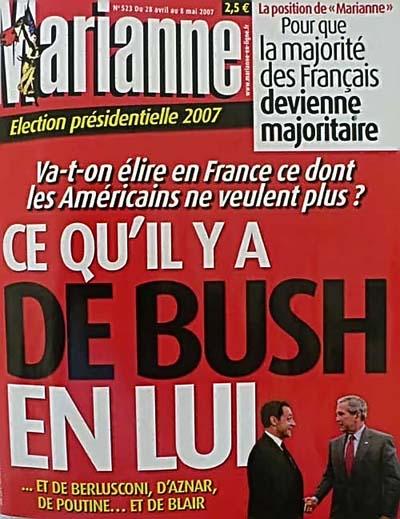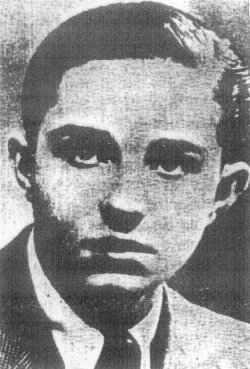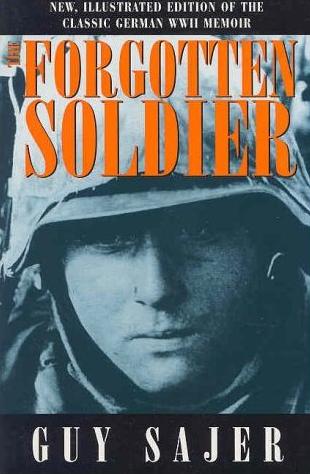Using Resistance heroes, forgetting soldiers, and selling wars
Sarkozy is the first French president who was not alive during WWII, so, while making a visit to Germany, now an important political and trading partner, he made clear his respect for the French Resistance:
- "... the new head of state did not wait long to depart from past protocol. On his way to the airport for his flight to Berlin, his motorcade made a highly symbolic stop at a monument commemorating the death of 35 young French resistance fighters who were shot by Nazi occupiers in August 1944.”
But he quickly reassured his German hosts that this wasn’t an attempt to open old wounds:
- " 'The Franco-German reconciliation was a sort of miracle and nothing must ever lead us to sacrifice the friendship that after so many difficulties now links the French and the German people,' Sarkozy said after a high school student read out a letter by a 17-year-old resistance fighter, Guy Môquet, who was executed by German officers in 1941. 'To end the eternal cycle of hatred and vengeance we had to build Europe.'"
http://www.iht.com/articles/2007/05/16/news/france.php
The letter which was read out can be read here:
Letter
In Fact Sarkozy has ordered the letter to be read in Lycées at the beginning of the academic year:
- "Nicolas Sarkozy annonce que sa « première décision » de président sera de faire lire dans toutes les classes du pays en début d’année scolaire, la lettre à ses parents du jeune résistant Guy Môquet avant son exécution."
http://bellaciao.org/fr/article.php3?id_article=48405
Some have objected to what they see as Sarkozy's exploitation or recuperation of the words of this young communist for Sarkozy's right-wing ideology, which they feel young communists of Môquet's generation fought against:
- "Aujourd’hui le même Sarko prend les idées de celui qui véhicule les mêmes idéologies que ceux qui ont posé une chape de plomb pendant 5 ans sur la France ;en les reprenant à son compte(- ce qui change de 1940 c’est que l’émigré a remplacé le juif -)non seulement il les banalise mais en plus il donne de la puissance a cette doctrine ,dont les jeunes de 40 avaient donné leur vie préçisément pour la combattre.
Vraiment monsieur Sarkozy vous me donnez envie de vomir."
J C Depoil
http://bellaciao.org/fr/article.php3?id_article=48405
In fact not only can Môquet's communism be seen as something of an embarrassment for Sarkozy, but the manner of his capture and selection for execution is not something that many in France care to remember. He was arrested, aged only 16, by French police rounding up communists for their new Nazi masters, and beaten up to try to get the names of his father's communist friends:
- "Guy Môquet était lycéen au lycée Carnot et fervent militant des jeunesses communistes. Après l'occupation de Paris par les Allemands et l'instauration du gouvernement de Vichy, Guy déploie une grande ardeur militante pour coller des papillons dans son quartier dénonçant le nouveau gouvernement et demandant la libération des internés. Il est arrêté à 16 ans le 13 octobre 1940 au métro Gare de l'Est par des policiers français qui recherchaient les militants communistes. Les policiers le passent à tabac pour qu'il révèle les noms des amis de son père."
He might have survived the war in prison, or even been released early, like Sartre, had it not been for the assassination of a Nazi officer by three young communists. The Nazis demanded that 50 French prisoners be executed in reprisal, and Pierre Pucheu, the Minister of the Interior in the Petain government selected 50 communists "to avoid letting 50 good Frenchmen be shot."
- Emprisonné à Fresnes, puis à Clairvaux, il est ensuite transféré au camp de Châteaubriant (Loire-Atlantique), où étaient détenus d'autres militants communistes.
Le 20 octobre 1941, Karl Hotz, commandant des troupes d'occupation de la Loire-inférieure, est exécuté à Nantes par trois jeunes communistes. Le ministre de l'Intérieur du gouvernement Pétain, Pierre Pucheu, sélectionne des otages communistes « pour éviter de laisser fusiller 50 bons Français »
http://fr.wikipedia.org/wiki/Guy_M%C3%B4quet
The Forgotten soldiers
But there is another aspect of the history of WWII which has also long been ignored, suppressed, forgotten; i.e. the fact that not all German soldiers were Nazi monsters and that many of them were idealistic young men like Guy Môquet.
By a striking coincidence, one of them has written one of the most powerful accounts of the experience of ordinary soldiers in WWII and was also only 16 when he became active in the war and was also named Guy. In fact he was also half French, but took his German mother’s maiden name - Sajer - when he decided to join the German army (despite having at first believed the post WWI propaganda about German soldiers):
- "... It was there in June 1940 when his family was stranded on the road as refugees that young Sajer first encountered the soldiers of the Wehrmacht who had only a few days before completed their conquest of France. In the interview Sajer related how in line with World War I propaganda he had feared that the Germans would cut off his hands. To his surprise instead of cutting off his hands the German Landsers handed him food and something to drink.
... While serving in labor service camps in Strasbourg and at Kehl right across the Rhine Sajer admitted envying his youthful German counterparts who seemed so self-confident and eager to serve their country. He remembers his own feelings of inadequacy watching them volunteering for combat. At the time combat seemed a great adventure but it was a privilege extended only to pure Germans. Finally in 1942 when German manpower shortages began to worsen and he turned sixteen Sajer was allowed to volunteer for military service. From July 1942 to May 1945 he served in a variety of German Army units on the Russian Front most notably the elite Grossdeutschland Division and took part in many of the critical defensive battles that eventually decided the fate of Germany in the East."
Its authenticity has been questioned by some military historians, overly pedantic about details of where badges were worn, etc. Sajer is scornful of such criticism:
- ... 'I succeeded in having this horror story from the Second World War published in a country hostile to me [France] against my own best interests and with all of the problems in describing the well-merited compassion I still feel for my German soldier comrades ... all of them. I conveyed the difficulty of these moments ... the anguish and the horror. I [publicly] acknowledged the courage and good will of German Landsers in a climate where one was not permitted to talk about them. I depicted their faithfulness and self-sacrifice ... I moved the hearts of millions. I have proudly glorified the honor of all German soldiers at a time in history when they were slandered and reviled. In my opinion this was my duty and I asked for nothing in return.' "
http://www.deutschesoldaten.com/books/sajer.htm
I agree with this reaction to Sajer's critics:
- ... "I've known guys in the army who fought in Vietnam who didn't know which sleeve their overseas stripes were sewn ...
Also, many people tend to discount the importance of the state of maturity of Sajer at the time - he turned 17 years old in January 1943 and volunteered for the GD's Feld-Ers.Btl. in April, 3 months later. So he was still a juvenile at the time and he admits himself that he was very immature. How many 17-year olds today can remember what the heck they did a week ago, much less something much further in the past? When Sajer initially drafted his manuscript in the late 1950s, the war had been over at least 10 years and many of the details of what took place in the past had been forgotten or mis-remembered ...
... Of course, Sajer could be a fake, that's always possible, but writing a book extoling the glories of the Wehrmacht and having it published in France in 1968 was considered at the time a very risky thing to do - if nothing else, Sajer was a brave man."
http://www.feldgrau.net/phpBB2/viewtopic.php?t=6928
But I doubt if Sarkozy will be quoting him.
"When the US wanted to take over France"
Fortunately the odious Pucheu who sent Môquet to his execution met the same fate:
- "... No one personified the Vichy regime better than Pucheu. In 1941 he became Darlan’s industry minister and then interior minister. He had served as a fundraiser for the fascist French People’s Party . He also championed economic collaboration with Germany and anti-communist repression, working on behalf of the Nazi occupation (including selecting communist prisoners executed in 1941 in retaliation for the assassin ation of German officers, and establishing special sections - anti-communist tribunals).
Spurned by Giraud, Pucheu was imprisoned in May 1943 and sentenced to death; he was executed in Algiers in March 1944."
http://mondediplo.com/2003/05/05lacroix
In this article Annie Lacroix-Riz reveals another bit of largely forgotten history, despite its contemporary relevance. Contrary to the usual myths, the US wasn’t just the altruistic liberator, eager to restore democracy to France:
- "The US was concerned that France, although weakened by its 1940 defeat, might reject the plan, especially if its presidency went to De Gaulle, who had vowed to restore French sovereignty. It feared France might use its nuisance capacity as it had when it opposed pro-German US policies after the first world war. France would not have wanted to relinquish its empire, rich in raw materials and strategic bases. The US had long called for an open door policy for goods and investments in all colonial empires (2). The US relied on twin strategies: ignoring De Gaulle, and dealing with Pétain’s regime with a combin ation of accommodation and toughness. It realised that Vichy, like the Latin American regimes dear to its heart, was more malleable than a government with broad popular support.
... The US depicted De Gaulle as a rightwing dictator and a puppet of French communists and the USSR... On 10 December 1944 France signed a treaty of alliance and mutual security with Moscow, to offset US power. De Gaulle described it in glowing terms.
Excluded from the Yalta conference in 1945 and dependent on the US, France became a key part of the US sphere of influence. But only vigorous resistance, internal and external, had saved it from becoming a US protectorate."
http://mondediplo.com/2003/05/05lacroix
The end of Gaullism?
Some right-wing Americans see Sarkozy, not so much as the first French president who has no experience of WWII, but as finally marking the end of Gaullism:

"Charles Kupchan, chercher au Council On Foreign Relations, le resumé ainsi:'Il brise le goule classique du leader de centre droit; il représente la fin du gaullisme traditionnel. Avec lui, vous n'entendrez plus le vieux refrain: "Il est temps que l'Europe émerge comme contre-poids à l'Amerique." ' "
Marianne, 28 Avril, 2007, p.18
But the US is not having much success as the dominant world power under Bush; Iraq is a disaster (despite Blair's absurd claim that the problem is the media are not reporting on all the progress there - even as the UK base in Basra was being mortared).
From US military propagandist to AL Jazeera journalist
Also one is encouraged to see that there are young American soldiers who see through the lies the war was based on, even one who at first believed them and whose job was to convince journalists (some of whom did their "journalism" by asking him: "What message would you like to get out today?"!).
I was impressed by Lt. Josh Rushing when I saw him in the documentary about Al Jazeera, "The Control room", which showed his obvious difficulty in believing the official line in the face of his actual experience in Iraq and his discussions with Al Jazeera journalists:
- "[The Control Room] invites dissenting voices to comment on the station's work, including US Marine Corps press officer Lt. Josh Rushing (tellingly, he has a sudden epiphany halfway through the film, realising that Al Jazeera is simply the inverse of the pro-American Fox News)."
http://www.bbc.co.uk/films/2004/07/07/control_room_2004_review.shtml
He has now left the US army and is working for the English-language version of Al Jazeera (like one of my ex-students, who tells me he is far more free from editorial control than he had felt with UK TV).
But of course the Right in the US tried to depict him as a "traitor"

"Amid the sudden publicity, Rushing ran afoul of the Pentagon. After defending Al Jazeera in an interview with the Village Voice, in which he suggested that the network showed a more realistic image of the war than the American media ('In America war isn't hell—we don't see blood, we don't see suffering. All we see is patriotism'), he was ordered to stop talking to the press. That didn't sit well with him. 'It's a weird place to be in when there's a national dialogue about you and you can't take part in it,' he says. 'When I came back from the war, I was frustrated by what I'd seen. I felt that what America thought it knew about Al Jazeera was wrong, and the way that America was engaging or not engaging with Al Jazeera was not only wrong but dangerous.'
...
When he joined the [Al Jazeera] network almost a year ago, he saw himself as a cultural emissary who could help the rest of the world understand the America he loves. Now, "more and more I see myself as a journalist," he says. "It's taking a long time to let go of that spokesperson side of me who wants to control the message and to embrace the side that's about letting the message be whatever you find. There's a real value to this journalism thing."
http://www.motherjones.com/news/outfront/2006/11/education_of_lt_rushing.html
He has now made a documentary showing the same pattern of lies used to justify each of the US attacks on other countries, from Vietnam, through Panama, to Iraq.
"Spin: The art of selling war"
It was made with the help of Norman Solomon, author of "War Made Easy":
- "If you don't have fun reading Norman Solomon's War Made Easy, you don't know how to have a good time. This exceptional book will drive our bonkers leaders and their mouthpieces in the US press crazier than they are already. Read one passage each night to your children to protect them from the brain-snatchers and dummy-fication zombies of America's news media of the living dead."
Greg Palast, author of The Best Democracy Money Can Buy
http://www.amazon.com/War-Made-Easy-Presidents-Spinning/dp/0471694797
That is, there is not a lot of "real value to this journalism thing" as currently practised by the corporate media - see also Bill Moyers' PBS documentary: "Buying the war":
http://www.pbs.org/moyers/journal/btw/watch.html
At least the Al Jazeera documentary is available on YouTube (most US TV channels won't carry Al Jazeera - English version). The documentary and the book make it clear that De Gaulle was right and a "contre-poids" to the US (as run by people like Bush) is very necessary and that it wasn't arrogance, as Sarkozy put it during this visit to the US, when the French refused to buy the nonsense Bush and co were trying to sell the UN about Iraq. If that was French arrogance, I echo Bush: "Bring it on!"



No comments:
Post a Comment